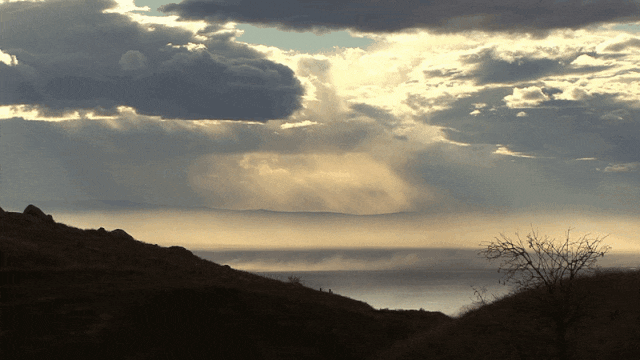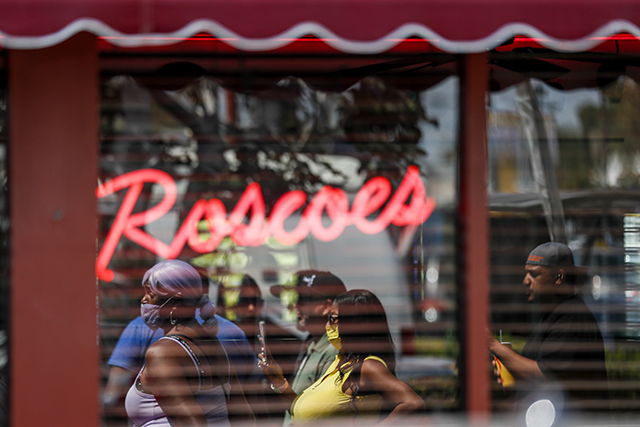
Good morning. It’s Wednesday, Sept. 14.
- California debuts website promoting abortion services.
- San Franciscans say the city is going downhill.
- And photos of life at UC Santa Cruz in 1969.
Statewide
1.
Gov. Gavin Newsom on Tuesday unveiled abortion.ca.gov. The publicly funded site guides women on how to get an abortion, links to financial help for travel, and offers a map showing California’s 166 abortion clinics. One section informs out-of-state teenagers that they can get an abortion in California without parental permission. Newsom juxtaposed the rollout with Sen. Lindsey Graham’s new bill to ban abortions after 15 weeks. “That’s their agenda,” he said. “CA’s fighting back.” A.P. | Axios
2.

In an effort to conserve groundwater in the San Joaquin Valley, California put regulations in place in 2014 that will require nearly 800 square miles of farmland to be retired in the next 20 years. But a July report by the nonpartisan Public Policy Institute warned of an unintended consequence: more dust in a region already suffering from the worst air quality in the country. The Atlantic described the prospect as a “mini Dust Bowl.”
3.
During the heat wave, Amazon drivers in California shared pictures of temperature readings inside their vans that surpassed 120 degrees. At an Amazon delivery hub in Ventura County, nearly half of the drivers vomited from heat-related illness, a manager said. Workers say Amazon’s monitoring practices pressure them to go beyond their limits. “It’s all about performance metrics,” said a driver in Riverside. Fall behind, and “you’re in trouble.” Reuters
4.
Gas prices have been plunging across the country — except in California. After 13 straight weeks of declines, the national average price per gallon was $3.70 on Wednesday. In California, the figure was $5.43, higher than it was a week ago and roughly even with the price in July. Analysts attribute the stubborn prices to several refineries going offline for maintenance, forcing more imports from abroad. Some state lawmakers suspect price gouging. Politico
Northern California
5.

A wide-ranging poll of San Franciscans found pervasive gloom in the city. Nearly two-thirds of residents said the city had gotten worse since they moved there. They cited familiar complaints: homelessness, public safety, and housing affordability. Roughly one-third said they were likely to leave within the next three years. “I’m getting kind of fed up with the city,” said Dae Echols, 53. “I just remember the hippie generation, and it was all about, take care of your friends, brotherly love. And that is totally gone.” S.F. Chronicle
6.
Twitter’s former top security official told Congress at a hearing Tuesday that executives disregarded concerns about foreign spies in its ranks. Peiter Zatko, who was fired in January, said agents for the Indian and Chinese governments were on the payroll of the San Francisco company and may have had access to sensitive data. He answered yes when asked if “all of the engineers and half of the employees at Twitter” have access to people’s accounts. “It doesn’t matter who has keys if you don’t have any locks on the doors,” he said. A.P. | Politico
7.

Fred Franzia, the California winemaker who created the wine popularly known as Two Buck Chuck, died at his home in a suburb of Modesto on Tuesday. At one time, Franzia claimed to own more than 40,000 acres of vineyard land, more than anyone in the country. A critic of highbrow wine culture, he annoyed some in the industry by saying no bottle should ever cost more than $10. “Who says we’re lower priced? We’re the best price,” Franzia told the San Francisco Chronicle in 2009. “The others, I think, are overpriced.” Franzia was 79. BuzzFeed News | Sacramento Bee
8.
Sally Schmitt and her husband, Don, founded the French Laundry in 1970. After the restaurant changed hands in 1994, the acclaimed chef Thomas Keller made it famous, overshadowing the Schmitts’ tenure there. But Sally Schmitt was a pioneer in California cuisine, helping to shape the Bay Area dining scene for decades. The Oscar-winning filmmaker Ben Proudfoot called his new short documentary about her “The Best Chef in the World.” N.Y. Times (~20 mins)
Southern California
9.

A century ago, California and six other states agreed to split water from the Colorado River. A series of deals, laws, and court cases that followed ensured that California would be the last to lose access in times of shortage. But with the Colorado now more stressed than ever, California may be forced to loosen its grip. For the Imperial Valley, which has no other source of water, that would be devastating. A.P.
10.

The police said on Tuesday that the person who fatally shot PnB Rock on Monday may have been alerted to his location by a social media post that tagged the rapper at a restaurant in Los Angeles. Chief Michel Moore said the gunman showed up at Roscoe’s House of Chicken and Waffles in South Los Angeles minutes after the woman with Rock posted a picture of their meal on Instagram. He demanded jewelry before getting into a struggle with the rapper and opening fire. L.A. Times
11.
Ontario, a once bucolic center of the dairy industry, has been transformed over the last decade into one of the busiest American hubs for the e-commerce industry. Instead of cattle feedlots, there are now more than 600 warehouses and cavalcades of 18-wheeler delivery trucks. The industry hasn’t just reshaped the landscape of the city in San Bernardino County, but also its air, job market, politics, and way of life. The Guardian
California archive
12.

One of the University of California system’s 10 campuses is not like the others. Founded in 1965, the university at Santa Cruz was modeled on the “living and learning” environments of Oxford and Cambridge. Students and professors would eat, sleep, and study in close proximity at one of a number of small colleges spread across the redwood forest overlooking Monterey Bay, creating an intimacy absent from larger institutions. Instead of grades, students would get written evaluations charting their growth as scholars.
Four years into the experiment, at the height of the counterculture movement, a reporter and a photographer for LIFE magazine went to UC Santa Cruz and met students who portrayed the institution as a sort of academic “catcher in the rye,” turning directionless young adults into seekers with a philosophy of life. Ron Richardson, a sophomore, explained: “What’s come clear here is that there’s wonder in doing anything — fixing a car, singing, reading, thinking, gardening. To sustain a sense of wonder in learning is what education should be all about. That’s what it really is all about here.”
See a selection of the photos by Grey Villet below, and more here. 👉 Google Arts & Culture





Editor’s note
A summary in an earlier version of this newsletter mangled some of the history of the 1922 Colorado River Compact. While the pact set rules for water rights among seven states. it did not bring about the transformation of California’s desert region of the Imperial Valley into farmland. That process had begun more than two decades earlier with the diversion of Colorado River water.
Thanks for reading!
The California Sun is written by Mike McPhate, a former California correspondent for the New York Times.
Get a California Sun mug, T-shirt, or hoodie.
Forward this email to a friend.
Click here to stop delivery, and here to update your billing information or cancel your support.
The California Sun, PO Box 6868, Los Osos, CA 93412
Wake up to must-read news from around the Golden State delivered to your inbox each morning.
